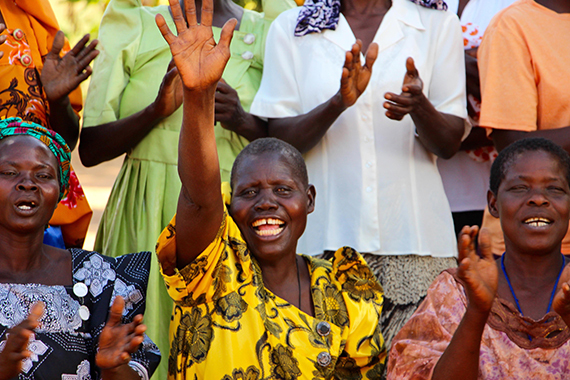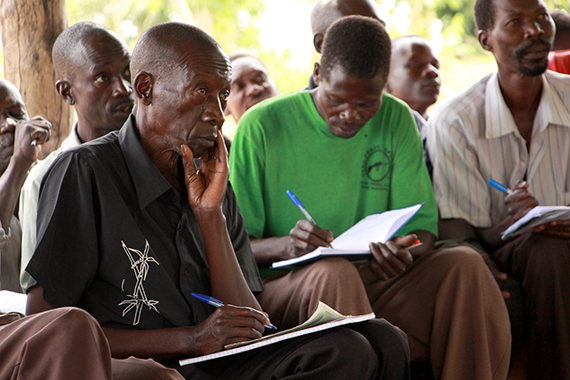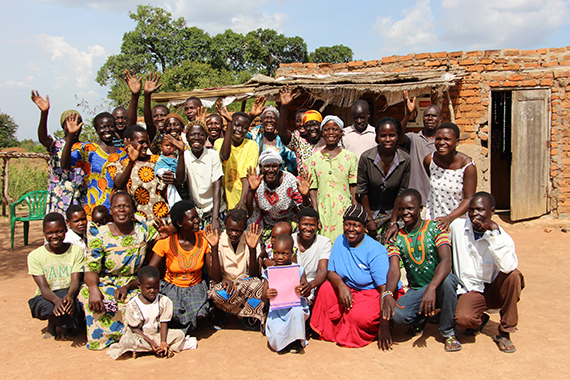Barry Segal, the founder of Segal Family Foundation, always says you can't be "all over the lot." Or to borrow from this guest blog by Hannah McCandless: "we pick our passion from the plethora of opportunities, do our part, and do it well." Over the past few years, we've seen the part that Village Enterprise has played in alleviating extreme poverty--it's real, it's transformative, and it's getting bigger every day. We are privileged to call them our partner!
When I began my fellowship with Village Enterprise, I would return from field visits bursting with questions about why we weren't doing more. Why aren't we connecting farmers to value chains? Why aren't we providing cell phones for mobile banking? Why don't we graduate participants from microgrants to microloans? Why can't we offer crop insurance? While on a recent drive with our COO Zach Hoins, I raised these questions. Zach's poignant response offered a thoughtful perspective on the value and necessity of our program design.
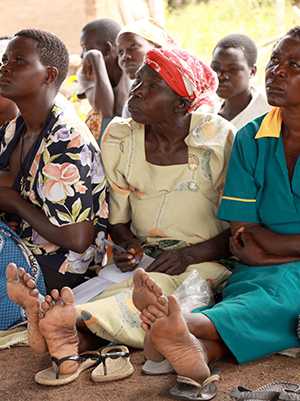 There is seemingly insatiable need, Zach explained. Working in Sub-Saharan Africa, we are all at times overcome by the scale of need. School fees are too high; investment is too low. Drought paralyzes one region while flooding overwhelms another. And yet, dwelling on the seemingly insurmountable challenges helps no one--provides no solution, alleviates no suffering. And so we take a step back and see that beyond the great need, Sub-Saharan Africa is bursting with innovation and unfathomable potential. We pick our passion from the plethora of opportunities, do our part, and do it well.
There is seemingly insatiable need, Zach explained. Working in Sub-Saharan Africa, we are all at times overcome by the scale of need. School fees are too high; investment is too low. Drought paralyzes one region while flooding overwhelms another. And yet, dwelling on the seemingly insurmountable challenges helps no one--provides no solution, alleviates no suffering. And so we take a step back and see that beyond the great need, Sub-Saharan Africa is bursting with innovation and unfathomable potential. We pick our passion from the plethora of opportunities, do our part, and do it well.
Village Enterprise chooses lifting families out of extreme poverty.
Our mission is to end extreme poverty in rural Africa through entrepreneurship and innovation. Our program provides the first rung on the ladder of financial inclusion for those living below $1.90 a day--empowering our participants to reach a point where they can begin to access more advanced financial inclusion services.
Extreme poverty is an issue of circumstance, not permanence. Those living in extreme poverty are potential teachers, doctors, artists, presidents, and innovators--individuals for whom access to financial services could unleash unimaginable promise. And yet, the very conditions that make those living in extreme poverty ideal candidates for such services are the same qualities that exclude them, causing them to be virtually unreached by typical financial inclusion interventions. A short stint of formal education or access to information through a radio or mobile phone could be all that separates the poor from the extreme poor. Translation? Those living at the "very bottom of the pyramid" lack the basic human, social, and financial capital needed to access financial services.
For instance, while microloans can effectively give a poor household a needed boost, they can be paralyzing for the extreme poor as loan repayments prevent business owners from using early profits to meet their families' basic needs and reinvest in their businesses. Mobile banking offers access to a life-changing platform for saving, but only to those with mobile technology. The households in our program don't have electricity, and only about 25% of our Ugandan participants own a mobile phone. Value chain integration through cooperatives connects poor and small-scale farmers to opportunities for growth. However, value chains demand large volumes and high quality products, which require intensive training and mobilization rarely available to the uneducated and rural, extreme poor.
Life-changing financial inclusion opportunities are not reaching those living in the most extreme conditions of poverty primarily because they live in extreme poverty. As a result, the potential of this population remains untapped. Our program meets our clients where they are and provides financial inclusion interventions that are appropriate and impactful: business generation, financial skills training, small grants, and savings networks that increase income and savings. Upon graduating from our program, business owners chose for themselves how best to reach the next rung on the ladder of financial inclusion, whether it's their children's school fees, a mobile phone, or diversifying their business.
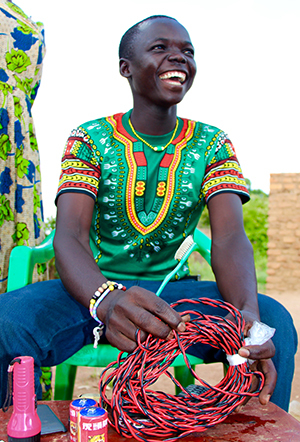 We recently celebrated Financial Inclusion Week, sponsored by the Center for Financial Inclusion at Accion. The theme was "keeping clients first in a digital world--ensuring that clients are empowered and protected in a financial ecosystem that has moved beyond brick and mortar to cell phones and Internet delivery channels." While the financial ecosystem may have moved beyond brick and mortar, the extreme poor have not. If the extreme poor continue to be left out of financial inclusion, the gap between those who have the means to be included and those who don't will continue to grow. Village Enterprise recognizes that not everyone has entered the digital world yet and financial inclusion for the extreme poor is not light touch--it requires multidimensional and contextually appropriate interventions. The need is significant, but the potential is limitless.
We recently celebrated Financial Inclusion Week, sponsored by the Center for Financial Inclusion at Accion. The theme was "keeping clients first in a digital world--ensuring that clients are empowered and protected in a financial ecosystem that has moved beyond brick and mortar to cell phones and Internet delivery channels." While the financial ecosystem may have moved beyond brick and mortar, the extreme poor have not. If the extreme poor continue to be left out of financial inclusion, the gap between those who have the means to be included and those who don't will continue to grow. Village Enterprise recognizes that not everyone has entered the digital world yet and financial inclusion for the extreme poor is not light touch--it requires multidimensional and contextually appropriate interventions. The need is significant, but the potential is limitless.
To feel powerless in the face of need is to ignore that need is only a signal of an opportunity to innovate. So, take a step back. Note the complexity. See the need and the potential, the lack and the abundant promise of the future. Pick your cause and work with intention, passion, and humility. We're ending extreme poverty, one household at a time, because providing fundamental financial inclusion interventions to the most economically marginalized allows them to begin fulfilling their potential.

